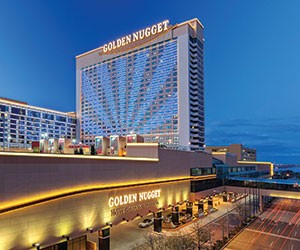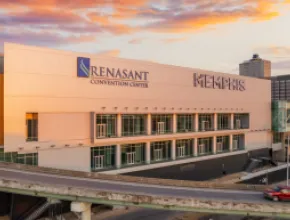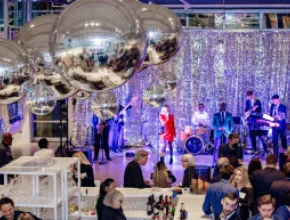It could have been catastrophic, but fortune, for the most part, was on Atlantic City’s side when Hurricane Sandy pounded the East Coast at the end of October. The “super storm” flooded streets, knocked out power and displaced many local residents north and south of the city.
But relative to what could have happened—the impact was closer to a stinging blow than a knockout punch. Look no further than the devastation in Seaside Heights—some 40 miles north of Atlantic City—to know the difference.
The news media initially misreported the extent of the damage to the city’s historic Boardwalk. In fact, only a small section of the walkway (already scheduled for demolition) was washed away, in a residential area south of the casinos.
“The entire oceanfront Boardwalk in front of the Atlantic City casinos is undamaged with all dunes and lights intact,” Thomas Gilbert, district commander of the Atlantic City Tourism District, told ABC News in the storm’s aftermath, setting the record straight. “There is minimal to no visible damage to the casinos and other businesses fronting the boardwalk along the ocean.”
Predictions that the 125 feet of sand on the Atlantic City beachfront would be reduced to just 25 feet after the storm never came to pass, either, but while spared significant physical damage, the city did sustain some momentary economic bruising.
With Sandy affecting transportation networks across the Northeast and thus a number of feeder markets—to say nothing of its impact on local workers and business owners—revenues at the casinos, which closed for a week because of Sandy, are expected to dip for the short term.
The storm also knocked out several major gatherings in November. For the first time in its 158-year history, the New Jersey Education Association canceled its annual two-day teachers convention because of safety concerns. Another long-running confab, the New State Jersey League of Municipalities, canceled its 97th annual conference.
“It’s going to take a few months before we get back to normal because of the impact to the homes and businesses of our customers,” Tony Rodio, president of the Casino Association of New Jersey, told a Philadelphia news outlet.
Again, though, it could have been so much worse.
“If there had been major storm damage to the casinos, that would have been an impact [on the resort] that would have lasted for years,” he said. “But that didn’t happen.”
In an open letter to the travel and meetings industry, Jeffrey Vasser, president and CEO of the Atlantic City Convention & Visitors Authority (ACCVA), said, “The Atlantic City Convention Center and Historic Boardwalk Hall, two of the Northeast’s top event and convention venues, are open for business with neither experiencing any significant damage from the unprecedented storm.”
Looking ahead, Vasser said the ACCVA continues to work closely with groups whose meetings, conventions, events or motorcoach trips were impacted by Hurricane Sandy.
“While we are seeking to quickly reschedule as many events as possible that were affected by the storm, we are also looking forward to working with all of our valued clients and partners to plan for future events in our world-class destination,” he said.
A setback more than a disaster, it appears that Sandy will be trumped by the significant ongoing progress in town—and the spirit of the community. PageBreak
New Brand Momentum
In April 2012, the Atlantic City Alliance (ACA) launched a rebranding effort named “Do Anything. Do Everything,” or “Do AC” for short. At $20 million, this unprecedented integrated media campaign, enthusiastically backed by New Jersey Governor Chris Christie, is the largest destination tourism marketing campaign in the city’s history.
Preceded by catalyzing investments in leisure-driven properties such as the Borgata Hotel Casino & Spa (opened in 2003) and its non-gaming sister The Water Club (opened in 2008), the campaign, aligned with ACA’s ongoing mission to rebuild Atlantic City’s reputation and revitalize tourism, was to build a year-round visitor base and shift consumer perception of the historic oceanside destination.
To measure the effectiveness of the campaign, the ACA commissioned baseline research before its launch and then again this summer following its introduction. Targeting 1,200 “fun seeking adults” in four different age ranges between 21 and 65, drawn equally from the New York, Philadelphia, Baltimore and Washington, D.C., markets, the online survey revealed positives across the board.
Among the key findings, “Do AC” has been effective in raising the visibility and recognition of non-gaming offerings such as shopping, dining, entertainment and golf, while also showcasing the city’s increasingly sophisticated and glamorous appeal. With travel campaigns typically benchmarked at around the 66 percent mark for likability, “Do AC” is tracking impressively in the 80 percent to 90 percent range. This high level of likeability is translating into promising results, with 85 percent of respondents prompted to take action, including 39 percent motivated to visit and 33 percent motivated to learn more about Atlantic City.
“The summer occupancy of 94 percent is an excellent indicator of the Atlantic City marketplace attracting more overnight visitors to our properties,” Rodio says. “Maintaining this occupancy level shows strong demand for Atlantic City. The industry wants more people to sleep over, to stay longer and to come back frequently as we look to build our visitation and to increase revenue.”
Named CEO of Las Vegas-based Tropicana Entertainment Inc. earlier this year, Rodio also serves as president of the Tropicana Resort in Atlantic City. Along with meetings-ready counterparts such as the 942-room Resorts Casino Hotel, Atlantic City’s first casino from 1968 with more than 60,000 square feet of space, it’s lights on and back to business at the 2,129-room Tropicana, one of New Jersey’s largest hotels with over 122,000 square feet of meeting space.
With 160,000 square feet of indoor space and another 90,000 square feet outside, the new 1,898-room Revel, opened in April 2012, is the latest component of Atlantic City’s ongoing renaissance. There’s more ahead, too (see Happenings), as Atlantic City focuses on getting the positive word out. PageBreak
Back On Track
With four leading casino-hotel properties to its name in Atlantic City, Caesars Entertainment is playing a significant post-Sandy role by rebranding all of its New Jersey billboards with positive wording. Cruise into town along the Atlantic City Expressway, for example, and messages like “Jersey Strong” and “Rebuilding Our Future” line the way.
As Gary Musich, vice president of convention sales for the ACCVA explains, these words of encouragement underscore community-wide commitment to getting Atlantic City right back on its feet.
“We turned the Atlantic City Convention Center into a staging area for rescue and recovery,” Musich says. “The Red Cross of Southern New Jersey and FEMA were among the emergency services providers who set up operations in the facility, which also provided shelter for people displaced by the storm.”
Describing his “immense pride” in how Atlantic City pulled together during and after Sandy, Musich also remarked about the “heartwarming” response from the meetings and hospitality industry as a whole.
“I have been in this business for 28 years, and I have never experienced such an outpouring of support and offers of help,” he says. “The outreach coming in from across the country is simply amazing and made me realize what a tight-knit family our industry really is.”
Equally inspiring, he adds, is the immediate rebound of convention and meetings activity.
“All of the groups that cancelled during or after the storm have rebooked for 2013,” Musich says. “We have literally jumped right back into business.”
Right after the storm, Borgata Hotel Casino & Spa announced its support to those affected by Hurricane Sandy through several initiatives, including establishing the Borgata Relief Fund with a $50,000 donation and further contributions from its associates.
“We recognize the devastation Sandy brought to the East Coast, including the impact to many of Borgata’s friends and family,” Tom Ballance, president and COO of Borgata Hotel Casino & Spa, said in a press release. “Through our commitment to the community, we hope these initiatives bring support to those individuals.”
It’s a spirit found elsewhere on the Jersey Shore, such as in Cape May County, below Atlantic City and encompassing the state’s southernmost coastal area.
“We have fielded calls from across the country and Quebec, one of our main summer visitor markets,” says Deborah Bass, assistant director of the Cape May County Department of Tourism. “It seems the farther you get away from the Jersey Shore, the more confusing the reports about the damage become. With all due respect to our more northerly coastal neighbors, that is not our story, though. Like Atlantic City, our news is more positive than negative, and we are weathering the storm’s aftermath together, as a community.”
Bringing widespread devastation and loss, “Superstorm” Sandy is a cloud with few silver linings—but as resilient “Jersey Strong” Atlantic City and its coastal neighbors have shown, the human spirit can always rise above the storm surge.
Regular contributor Jeff Heilman has covered Atlantic City for Meetings Focus East for the past several years.







